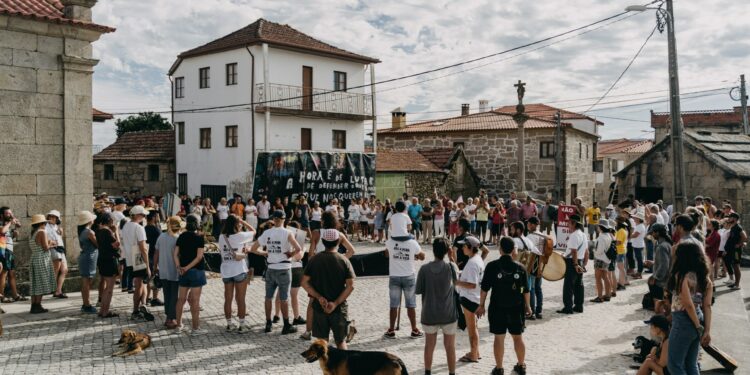Portuguese authorities announced they would launch an international public auction of lithium mining concessions, but the sale has been repeatedly postponed over concerns about the social and environmental impact of mining – and a recent corruption probe.
In November, an investigation into alleged corruption related to lithium mining, hydrogen and data centre projects led to the resignation of Portuguese Prime Minister Antonio Costa after prosecutors detained his chief of staff. The former secretary of state for energy and president of the Portuguese environmental agency were named suspects.
Campaigns by local communities against lithium mining have urged authorities to suspend all lithium projects, which they say lack transparency. But prospection works have continued in Barroso, even as governmental buildings and the companies’ offices were searched.
Savannah Resources says the project in Barroso could create hundreds of jobs and contribute more than 1 billion euros ($1.09bn) to Portugal’s gross domestic product. But the promises of economic development have failed to convince locals, who fear mining will destroy their livelihoods and bring short-term profits to only a few.
“We already have jobs,” said Alfredo Cadime, a producer of Barrosa beef, a prized breed of native cattle. “We have pure air, clean water, good-quality products. This is what we need to invest in.”
Barroso is the only region in Portugal – and one of only eight in Europe – recognised by the Food and Agriculture Organization (FAO) as a Globally Important Agricultural Heritage System of outstanding landscapes that combine agricultural biodiversity, resilient ecosystems and a valuable cultural heritage.
Locals fear the proposed mine will be open for only about 10 years but will leave behind a scarred landscape that could take centuries to recover.
Environmental impact
While Portugal’s central government has defended the project as an important asset, local authorities are less enthusiastic about plans to blast Barroso’s hills and dig out giant pits in a region renowned for its agricultural heritage.
“Our ancestors left us a very rich heritage,” said Fernando Queiroga, the mayor of Boticas municipality, which includes Covas do Barroso. “Will I leave my children a devastated land?”
A vocal opponent of the mining project, Queiroga has vowed to use all means to stop it, including legal challenges to halt the operations.
Savannah Resources has promised to follow “the best quality standards” and comply with all regulations. Locals bemoan what they call an absence of transparency and say they were not consulted about the mining plans.
For Nuno Forner, from the environmental association ZERO, the public lack of trust in mining companies is understandable given the industry’s long history of environmental destruction and lack of accountability.
“There are 199 abandoned mines and many continue to affect local populations today,” he said.
Several companies would rather pay a fine than subsidise the rehabilitation of mining territories.
Speaking at a conference on so-called “green mining” held in Lisbon in 2021, Peter Handley, the head of the European Commission’s raw materials unit, said mining in the past was a “very dirty operation” that is becoming “highly technological these days”.
“Open-pit mining, heavy machinery powered by fossil fuels, hundreds of trucks on the roads. How can any of this be called green?” asked Queiroga. “Green is what we have: our forests and our landscapes which will be destroyed by this project.”
Experts have raised concerns about the cumulative impact of the two large-scale mining projects on local ecosystems, biodiversity and threatened species.
“Barroso is a biodiversity hot spot with a mosaic of meadows and forests. There are 106 species of butterflies, including some of the rarest in Europe. They may disappear if their habitats are destroyed,” warned Ernestino Maravalhas, a lepidopterist who has published several books on Barroso’s biodiversity.
In addition to having indigenous livestock breeds and the rare Garrano horse, Barroso is home to important populations of Iberian wolf, a priority species classified as endangered, and critically endangered freshwater pearl mussels.
Environmentalists argue the anticipated harms far outweigh the benefits of lithium mining in Barroso.
“The impacts on the territory, on water and on people’s health will be very significant,” said Forner.
A green transition should include rethinking the way we use the earth’s limited resources, he said.
“We need to reduce the quantity of private vehicles and invest in public transport. Replacing one car with another won’t really solve our problems.”
Source link : https://www.aljazeera.com/features/2024/1/30/europes-thirst-for-lithium-threatens-livelihoods-biodiversity-in-portugal
Author :
Publish date : 2024-01-30 08:00:00
Copyright for syndicated content belongs to the linked Source.


